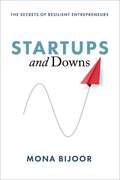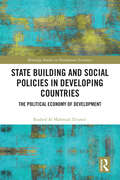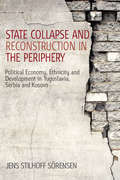- Table View
- List View
Startups Fuera de Serie: Aplasta la Competencia con tu Startup Innovadora
by Jonathan S. WalkerHaz que tu negocio comience como nunca antes con estas estrategias vitales ¿Deseas que tu startup pueda comenzar con el pie derecho sin mucho esfuerzo? ¿Necesitas una forma de atraer posibles inversionistas para obtener ventaja sobre la competencia? ¿Deseas obtener un impulso rápido para que tu startup crezca exponencialmente en los próximos meses? Te presentamos Startups Fuera de Serie: ¡Aplasta la Competencia con tu Startup Innovadora! Estrategias probadas para que lleves a su negocio a donde necesita ir. Estas son algunas de las cosas que aprenderás en este libro para que tu negocio tenga un gran comienzo: •Ganando tracción para tu inicio •Uso de correos electrónicos a tu favor •Aprovechando el Marketing de correos electrónicos (Estrategias principales para campañas) •Estrategias de marketing viral •Escalar de pequeño a grande •Cómo aprovechar el marketing de afiliados •Aprovecha el poder del mercadeo en red para tu inicio Y mucho, mucho más. ¡Obtén tu copia de este libro hoy mismo! No te pierdas los increíbles enfoques incluidos en este poderoso libro de estrategia empresarial. ¡El precio puede subir pronto así que date prisa! ¡Desplázate hasta la parte superior y presiona el botón "Comprar ahora" Hoy!
Startups and Crisis Management
by Dafna KarivDrawing on a mixture of theory, cases, and interviews, Startups and Crisis Management provides a valuable overview of how new ventures fared in the wake of the COVID-19 pandemic. It then considers the wider lessons for startups operating in times of crisis and adjusting to the ‘new normal’. The macroeconomic shocks of rising unemployment, lockdowns, and remote working have impacted the entrepreneurial ecosystem and raised questions about how startups can survive, adjust, and thrive once more. This book analyses the reciprocal relationship between startups and their ecosystems, using theoretical lenses such as push and pull factors, necessity entrepreneurship, networking, and embeddedness. Each chapter contains case studies based on interviews with individuals from startups around the world, exploring how real-life firms reacted to the coronavirus crisis. This illuminating text will be a useful resource for modules exploring startups during times of crisis, and courses on entrepreneurship and crisis management more broadly.
Startups and Downs: The Secrets of Resilient Entrepreneurs
by Mona BijoorEntrepreneurship is a cycle of failures and recoveries-hopefully with more successes than not. This national bestseller is about resilience and navigating the process. How do the best entrepreneurs think about failure-as it's happening and in hindsight-and ultimately win? Today&’s media is replete with stories about major entrepreneurial successes, IPOs (initial public offerings), mergers, and acquisitions. Reporters and readers alike have also been captivated by the stories of entrepreneurial failures, downfalls, and massive exits (think Travis Kalanick, Elizabeth Holmes, and Doug Evans). However, entrepreneurship is rarely linear, and a lot happens between the headlines and reality. Entrepreneurship is a cycle of failures and recoveries—hopefully with more successes than not. Start-Ups and Downs: The Secrets of Resilient Entrepreneurs shares the wisdom of one entrepreneur who successfully disrupted an entire industry but felt as if she was never prepared for what came next. Mona Bijoor has created a guidebook for navigating the process, from pitching with power to coping with competition, with inspiring stories from respected entrepreneurs, including Nat Turner, cofounder and CEO of Flatiron Health; Courtney Nichols Gould, founder and co-CEO of SmartyPants Vitamins; and Stephen Kuhl, cofounder and CEO of Burrow, intended to lift up anyone determined to keep pushing forward. This book is about resilience. How do the best entrepreneurs think about failure—as it&’s happening and in hindsight—and ultimately win?
Startups and Gazelle Enterprises: Insights into the Success and Challenges of High-Growth Firms (SIDREA Series in Accounting and Business Administration)
by Salvatore Loprevite Stefano Marasca Domenico Nicolò Marcantonio Ruisi Claudio TeodoriPolicymakers and scholars have shown growing interest in startups, particularly in recent years of economic crisis, as nations seek to rebuild their economies and foster employment through entrepreneurship and innovation. Many new businesses fail in their early stages due to insufficient access to the financial and managerial resources needed to sustain their expansion. Only a few survivors experience substantial growth and contribute significantly to job creation (the so-called 'Gazelle enterprises'). This book delves into this evolving field of research, featuring contributions from Italian scholars affiliated with the Startup Study Group of SIDREA, the Italian Society of Accounting and Business Administration. The authors examine the key factors that influence the success or failure of startups, with a focus on identifying enterprises with a high probability of survival and growth. The volume also explores related topics such as sustainability, performance measurement, and valuation of startups. Designed to bridge theory and practice, this book is a valuable resource for academics and finance professionals alike, offering insights into the best practices and strategies that drive successful startups.
Startups and Innovation Ecosystems in Emerging Markets: A Brazilian Perspective
by Moacir De Oliveira Jr. Fernanda Ribeiro Cahen Felipe Mendes BoriniThis book examines the behavior of high-tech startups and important aspects of innovation ecosystems in Brazil. It discusses how the local business environment boosts startups and high-tech entrepreneurship, leading to the most successful implementation of technology parks and incubation movements in Latin America. In the first part, the chapters explore the experience of Brazilian high-tech startups with regard to innovation, funding, background of the entrepreneur and their efforts entering international markets. The second part is dedicated to innovation ecosystems and explains the role of business incubators, acceleration programs, and university entrepreneurship in the country.
Startups in Action: The Critical Year One Choices That Built Etsy, HotelTonight, Fiverr, and More
by JP SilvaThe growing pains of a startup’s initial year in business require a keen awareness of uncertainties and a willingness to adapt in order to survive. Today’s new founders greatly benefit from taking a behind-the-scenes look at successful companies such as Etsy, HotelTonight, Fiverr, and more in regards to how they overcame the challenges of their first year. Startups in Action is your curated source for critical insights and inspiration from those who have been there before.This book documents the month-to-month journeys of these companies in their first year, zeroing in on key decisions that helped them recover from missteps, and adapt to complications, to eventually grow and succeed. Were the founders full-time from the beginning? How long did it take them to build a working prototype? How many end-users did they have in the first year? The answers to these questions are of interest to those who are just starting out and want to learn by example. Collected from interviews with the founders themselves, author JP Silva answers these questions and reveals how each of the startups charted their paths to success. Startups in Action is equal parts inspirational and practical, providing guidance through a foundation of relatability to help cope with situations and surprises experienced during a startup’s first year. Startup discourse is rife with myths and oversimplification. Cut through the noise and learn the events, actions, and counteractions only attainable from the founders themselves. As more and more aspiring entrepreneurs are about to start their journeys, the value of knowledge about difficult choices and obstacles that companies face in their first year is critical. With Startups in Action, you will benefit from the invaluable knowledge of experience and be prepared to face the challenges of building a successful startup. What You Will Learn Acquire critical insights from the most successful startups, easily available and collated in one bookCompare and contrast the first year journey of your startup with that of giants such as Etsy, StubHub, Fiverr, and moreLearn how to build better startups by understanding what you should or should not do Who This Book Is ForThis book is for new and aspiring founders, and those curious to learn about the journeys of successful startups.
Startups international: Erfolgsfaktoren, Motivationen und persönliche Hintergründe
by Anabel Ternès Matthias SchäferDie 2. Auflage dieses Bandes überzeugt durch aktualisierte Daten und einen erweiterten allgemeinen Teil, der neue Erkenntnisse zum Thema mit in den Blick nimmt.Was macht erfolgreiches Gründen aus? Und wie wird man eigentlich zum Gründer? Startup-Gründer aus der ganzen Welt wurden für dieses Buch zu ihrer Kindheit, ihrer Unternehmensgeschichte und zu ihrer Motivation, ihren Krisen und ihren Erfolgsgeheimnissen interviewt. Die mehrstündigen Gespräche wurden mit jedem Gründer auf der Basis eines Leitfadens mit zentralen Fragen geführt. Herausgekommen sind Geschichten, spannende Einblicke in die Höhen und Tiefen der Biographien der Gründer. Kurz, ganz persönliche Einblicke in die internationale Welt der Startups. Ergänzend zu den Geschichten wurden alle Interviews wissenschaftlich ausgewertet und analysiert, um einen Einblick in den internationalen Startup-Kosmos zu bekommen.
Startups revolucionárias: Elimine a Concorrência Com Sua Startup Inovadora
by Jonathan S. WalkerComece o seu negócio como nunca antes possível com essas estratégias vitais Deseja que sua startup comece da melhor maneira sem muito esforço? Você precisa atrair possíveis investidores para obter uma vantagem sobre a concorrência? Você quer ganhar impulso rápido para que sua startup cresça exponencialmente nos próximos meses? Apresentando Startups Revolucionárias: Esmague a Concorrência Com Sua Startup Inovadora! As estratégias comprovadas para levar sua empresa aonde ela precisa ir. Aqui estão algumas das coisas que você aprenderá neste livro para começar bem o seu negócio: Ganhando tração para sua startup Usando e-mails para sua vantagem Capitalizando no Marketing por Email (principais estratégias para campanhas) Estratégias de Marketing Viral Dimensionamento de Pequena para Larga Escala Como se Alavancar no Marketing de Afiliados Aproveitando o Poder do Marketing de Rede para sua Startup E muito, muito mais! Pegue sua cópia deste livro hoje! Não perca todas as coisas incríveis reunidas neste poderoso livro de estratégia de negócios. O preço pode subir logo, então se apresse! Vá até o topo e pressione o botão "Comprar agora" hoje!
Starvation And The State
by Steven SerelsSudan has historically suffered devastating famines that have powerfully reshaped its society. This study shows that food crises were the result of exploitative processes that transferred resources to a small group of beneficiaries, including British imperial agents and indigenous elites who went on to control the Sudanese state at independence.
Starvation and India's Democracy (Routledge Advances in South Asian Studies)
by Dan BanikThis book analyzes India’s impressive efforts in responding to sensational and easily visible disasters in contrast to the ‘silent emergency’ of drought-induced under nutrition and starvation deaths. Building on Amartya Sen’s famous claim that no famine has ever occurred in a democratic country, it re-examines the relationship between democracy, public action and famine prevention. Drawing on both quantitative and qualitative data in India at national, state and local levels as well as in-depth field visits to two states on India’s east coast, Orissa and West Bengal, the author analyzes the following issues: the interaction between specific institutions in India and their accountability to the public the role of the media in highlighting problems of extreme poverty and destitution and the effectiveness of political and administrative responses to such reports the extent to which tribal groups are vulnerable to starvation and famine, and an analysis of whether starvation deaths in drought-prone Kalahandi district in Orissa are unique in India the impact of two major nutrition programmes, the Public Distribution System (PDS) and the Integrated Child Development Services (ICDS), in reducing the incidence, duration and impact of starvation deaths. Starvation and India’s Democracy will be of interest to researchers in economics, political science, philosophy, development studies and South Asian studies.
Starve and Immolate: The Politics of Human Weapons
by Banu BarguTells the story of leftist political prisoners in Turkey who waged a deadly struggle against the introduction of high security prisons by forging their lives into weapons.
Starved for Science: How Biotechnology Is Being Kept Out of Africa
by Robert PaarlbergListen to a short interview with Robert Paarlberg Host: Chris Gondek | Producer: Heron & Crane Heading upcountry in Africa to visit small farms is absolutely exhilarating given the dramatic beauty of big skies, red soil, and arid vistas, but eventually the two-lane tarmac narrows to rutted dirt, and the journey must continue on foot. The farmers you eventually meet are mostly women, hardworking but visibly poor. They have no improved seeds, no chemical fertilizers, no irrigation, and with their meager crops they earn less than a dollar a day. Many are malnourished. Nearly two-thirds of Africans are employed in agriculture, yet on a per-capita basis they produce roughly 20 percent less than they did in 1970. Although modern agricultural science was the key to reducing rural poverty in Asia, modern farm science—including biotechnology—has recently been kept out of Africa. In Starved for Science Robert Paarlberg explains why poor African farmers are denied access to productive technologies, particularly genetically engineered seeds with improved resistance to insects and drought. He traces this obstacle to the current opposition to farm science in prosperous countries. Having embraced agricultural science to become well-fed themselves, those in wealthy countries are now instructing Africans—on the most dubious grounds—not to do the same. In a book sure to generate intense debate, Paarlberg details how this cultural turn against agricultural science among affluent societies is now being exported, inappropriately, to Africa. Those who are opposed to the use of agricultural technologies are telling African farmers that, in effect, it would be just as well for them to remain poor.
Starving the Beast: Ronald Reagan and the Tax Cut Revolution
by Monica PrasadSince the Reagan Revolution of the early 1980s, Republicans have consistently championed tax cuts for individuals and businesses, regardless of whether the economy is booming or in recession or whether the federal budget is in surplus or deficit. In Starving the Beast, sociologist Monica Prasad uncovers the origins of the GOP’s relentless focus on tax cuts and shows how this is a uniquely American phenomenon. Drawing on never-before seen archival documents, Prasad traces the history of the 1981 tax cut—the famous “supply side” tax cut, which became the cornerstone for the next several decades of Republican domestic economic policy. She demonstrates that the main impetus behind this tax cut was not business group pressure, racial animus, or a belief that tax cuts would pay for themselves. Rather, the tax cut emerged because Republicans believed that following World War II, Democrats had created an extremely durable power structure based on offering government programs to Americans, through which they were able to unify an otherwise fractious coalition of farmers, workers, and African Americans and retain control of Congress for four decades. Republicans were reduced to lecturing about balanced budgets, an issue that did not win them many elections. The Republican party began to see tax cuts as an opportunity to alter these basic building blocks of American power. If Democratic power was built out of government programs, Republicans found a new power source in offering tax cuts. Once it became clear that the resulting deficits could be financed by foreign capital, this program reoriented the Republican Party, transforming it from the party of fiscal rectitude into a party whose main domestic policy goal is reducing taxes. With one party promoting government programs to appeal to voters and the other party promoting tax cuts to appeal to voters, and neither party able to generate electoral coalitions around addressing more pressing political and economic problems, this history reveals problems at the heart of contemporary American democracy itself. Prasad suggests some ways forward. Since the end of World War II, many European nations have combined strong social protections with policies to stimulate economic growth such as lower taxes on capital and less regulation on businesses than in the U.S. Starving the Beast suggests that taking inspiration from this model of progressive policies embedded in market-promoting political economy could serve to build an American economy that works better for all.
State
by Rawi AbdelalSurveys approaches to understanding the state; highlights the relationships between the state, order, and property; and offers an analytical framework for how states vary from place to place and over time.
State Aid Law and Business Taxation
by Wolfgang Schön Isabelle Richelle Edoardo TraversaThis book is a compilation of contributions exploring the impact of the European Treaty provisions regarding state aid on Member States' legislation and administrative practice in the area of business taxation. Starting from a detailed analysis of the European Courts' jurisprudence on Art. 107 TFEU the authors lay out fundamental issues - e. g. on legal concepts like "advantage", "selectivity" and "discrimination" - and explore current problems - in particular policy and practice regarding "harmful" tax competition within the European Union. This includes the Member States' Code of Conduct on business taxation, the limits to anti-avoidance legislation and the options for legislation on patent boxes. The European Commission's recent findings on preferential "rulings" are discussed as well as the general relationship between international tax law, transfer pricing standards and the European prohibition on selective fiscal aids.
State And Local Public Finance (Fourth Edition)
by Ronald C. FisherNow in its 4th edition, State and Local Public Finance provides a comprehensive and sophisticated analysis of state and local government public finance practices and issues, using the basic tools of economics. For this new edition, there is a focus on the most important services provided in the state-local sector: education, health and welfare, public safety, and transportation. This textbook provides an examination and analysis of public finance practices and problems in a federal fiscal system, focusing on the fiscal behavior and policies of state and local governments. The author presents detailed descriptions of significant institutions. Modern economic theory is applied to examine the way these institutions are used to produce and finance services, and to provide evaluation of alternative policies. Although the emphasis is on U. S. institutions and issues, much of the economic analysis can be applied to any federal system or to fiscal decentralization. This fully revised new edition sees updates throughout to data, topics, and applications. The Headlines and Applications sections reflect the most current policy issues affecting state and local governments. These include the effects of the Great Recession on state and local governments, changes in the tax treatment of internet purchases, the Affordable Care Act and implications for Medicaid spending by state governments, demographic changes and the implications for state-local finances, the implications of changes in automobile technology for transportation financing, and the potential for increased gambling activity. This text will continue to be invaluable reading for those who study public finance, local government finance, urban economics and public policy and public administration.
State And Society In Brazil: Continuity And Change
by John D Wirth Edson De Nunes Thomas BogenschildThis volume grew out of a conference series sponsored jointly by the Stanford-Berkeley Joint Center for Latin American Studies and the Instituto Universitario de Pesquisas do Rio de Janeiro (IUPERJ). Entitled "Opportunities and Constraints in Peripheral Industrial Society: The Case of Brazil," the first conference was held in Nova Friburgo in July 1983 and was followed up by another at Berkeley in late January 1984. In the course of our discussions, the subject matter widened so that a new title was chosen for this book. Also,in the interim, as Brazil made the transition to democracy and returned to economic growth, many topics on the agenda for the 1980s emerged in clearer focus, so that the chapters have all been sharpened and upgraded. In the division of labor that produced this book, Nunes coordinated the project at Berkeley and in Brazil, while Wirth and Bogenschild did the editing.
State Bank of India: Transforming a State Owned Giant
by Rajiv Lal Rachna TahilyaniFebruary 2011: O.P. Bhatt reflected contentedly on his five-year term as Chairman of State Bank of India (SBI), India's largest commercial bank. He had led SBI on a journey of transformation from an old, hierarchical, transaction oriented, government bank to a modern, customer focused, and technologically advanced universal bank. In 2006, when Bhatt assumed leadership, SBI had been losing market share for over two decades to private and foreign banks. Analysts and industry observers had predicted that at the prevailing growth rates ICICI Bank, a private bank launched in 1994, would overtake SBI in terms of deposits in four years. However, by 2010, SBI had more than doubled its profits, deposits and advances; regained market share and won the Asian Banker Achievement award for the strongest bank in the Asia Pacific region.
State Bank of India: Transforming a State Owned Giant
by Rajiv Lal Rachna TahilyaniFebruary 2011: O.P. Bhatt reflected contentedly on his five-year term as Chairman of State Bank of India (SBI), India's largest commercial bank. He had led SBI on a journey of transformation from an old, hierarchical, transaction oriented, government bank to a modern, customer focused, and technologically advanced universal bank. In 2006, when Bhatt assumed leadership, SBI had been losing market share for over two decades to private and foreign banks. Analysts and industry observers had predicted that at the prevailing growth rates ICICI Bank, a private bank launched in 1994, would overtake SBI in terms of deposits in four years. However, by 2010, SBI had more than doubled its profits, deposits and advances; regained market share and won the Asian Banker Achievement award for the strongest bank in the Asia Pacific region.
State Building and Development
by Keijiro Otsuka Takashi ShiraishiWhy does a huge income gap still exist between developed and developing countries? Plausible causes on the surface may be the difference in technology, the quality of human resources, and economic institutions, but on the deeper level the gap reflects the success and failure of state building which is vital for economic development. This book provides cutting-edge knowledge on state building, economic development, and democratization based on case studies of Japan, ASEAN, South Asia, and selected countries in sub-Saharan Africa. The book examines the interaction between land policies and the state building in sub-Saharan Africa. It also pays special attention to corruption, which affects the relationship between the state and the development, and decentralization, which exerts influences on the contentious politics. Finally, the book also sheds new light on the failure and success of industrial policies based on a literature review and a case study of the rapidly growing pharmaceutical industry in Bangladesh. This book is one of the few studies which squarely addresses state building and economic development, and will be of use to those interested in this subject, development practitioners, and policymakers in developing countries.
State Building and Social Policies in Developing Countries: The Political Economy of Development (Routledge Studies in Development Economics)
by Rashed Al Mahmud TitumirThis book moves away from the orthodox neoliberal paradigm to suggest a new framework linking social policy with citizenship and transformation. The interjection of nation-building, public society and public provisioning to the study of education, healthcare and employment caters to the needs of citizens equitably. By combining and coagulating these three broad arenas of politico-economic discussion, this book takes a new approach to the analysis of social policymaking in developing countries to indicate the drivers and triggers of transformation. It makes comprehensive, thorough critical comparisons between the trajectories of developed and developing countries, finds out the gaps in transformation, and suggests drivers for changes. The intentions of social policymaking, as proposed in the book, are to curb the growing inequalities in the forms of class, power and marginalisation. The chapters on education focus on provisioning of public goods for skills formation, innovation and citizenship education. The sections on healthcare centre on universal healthcare as opposed to universal health coverage by analysing access, healthcare seeking behaviour, price setting, market provisioning etc. For the chapters on employment, propositions are posited regarding expansion of productive capacity, factor mobility and social security to ensure work for all. Besides theorising education, healthcare and employment based on public provisioning by the people’s state, underwritten by a public society, the book provides feasible solutions through data sourced from all major international organisations. In addition, it recognises the unique post-colonial struggles and aspirations of the developing countries, and accordingly resorts to defining the above normative principles, reflecting nuances, subtleties and peculiarities. This book is a continuation of Fiscal and Monetary Policies in Developing Countries: State, Citizenship and Transformation (Routledge) and will draw the attention of scholars and researchers who wish to gain a deeper understanding of, and pragmatic solutions to, social policies that address the transformational pathways of developing countries, accentuated by the COVID-19 pandemic.
State Capital and Private Enterprise: The Case of the UK National Enterprise Board (Routledge Library Editions: Public Enterprise and Privatization)
by Daniel C. KramerTo what extent can governments supplement private venture capitalists and stimulate the economy by providing money to new entrepreneurs as well as existing enterprises? The UK’s National Enterprise Board (NEB) attempted to do just this, and whilst it gained most publicity through its efforts to bail out ailing giants such as British Leyland and Rolls Royce Aerospace, much of its attention was actually directed to smaller ventures. Originally published in 1988 Professor Kramer reports that the NEB’s record of success was surprisingly good, and that many flourishing undertakings would not be in business today had it not been for the NEB’s efforts. The author goes further, and after discussing the political and economic issues involved in according public aid to private enterprises on a case by case basis, he argues that not only should the UK revive its NEB, but that other countries, notably the United States, could benefit by establishing their own versions of it. Indeed, throughout, the author’s perspective as an outsider makes him peculiarly alive to the relevance of the UK example to a whole range of international cases. As the first scholarly, full-length study of the NEB, this book will be of value to those interested in the relationships between venture capitalists generally and the enterprises in which they take equity. It will also interest those studying the relationship between holding companies and their subsidiaries.
State Capitalism: How the Return of Statism is Transforming the World
by Joshua KurlantzickThe end of the Cold War ushered in an age of American triumphalism best characterized by the "Washington Consensus:" the idea that free markets, democratic institutions, limitations on government involvement in the economy, and the rule of law were the foundations of prosperity and stability. The last fifteen years, starting with the Asian financial crisis, have seen the gradual erosion of that consensus. Many commentators have pointed to the emergence of a powerful new rival model: state capitalism. In state capitalist regimes, the government typically owns firms in strategic industries. Not beholden to private-sector shareholders, such firms are allowed to operate with razor-thin margins if the state deems them strategically important. China, soon to be the world's largest economy, is the best known state capitalist regime, but it is hardly the only one. In State Capitalism Joshua Kurlantzick ranges across the world - China, Thailand, Brazil, Russia, South Africa, Turkey, and more - and argues that the increase in state capitalism across the globe has, on balance, contributed to a decline in democracy. He isolates some of the reasons for state capitalism's resurgence: the fact that globalization favors economies of scale in the most critical industries, and the widespread rejection of the Washington Consensus in the face of the problems that have plagued the world economy in recent years. That said, a number of democratic nations have embraced state capitalism, and in those regimes, state-backed firms like Brazil's Embraer have enjoyed considerable success. Kurlantzick highlights the mixed record and the evolving nature of the model, yet he is more concerned about the negative effects of state capitalism. When states control firms, whether in democratic or authoritarian regimes, the government increases its advantage over the rest of society. The combination of new technologies, the perceived failures of liberal economics and democracy in many developing nations, the rise of modern kinds of authoritarians, and the success of some of the best-known state capitalists have created an era ripe for state intervention. State Capitalism offers the sharpest analysis yet of what state capitalism's emergence means for democratic politics around the world.
State Collapse and Reconstruction in the Periphery: Political Economy, Ethnicity and Development in Yugoslavia, Serbia and Kosovo
by Jens SörensenIn the 1990s, Yugoslavia, which had once been a role model for development, became a symbol for state collapse, external intervention and post-war reconstruction. Today the region has two international protectorates, contested states and borders, severe ethnic polarization and minority concerns. In this first in-depth critical analysis of international administration, aid and reconstruction policies in Kosovo, Jens Stilhoff Sörensen argues that the region must be analyzed as a whole, and that the process of state collapse and recent changes in aid policy must be interpreted in connection to the wider transformation of the global political economy and world order. He examines the shifting inter- and intracommunity relations, the emergence of a "political economy" of conflict, and of informal clientelist arrangements in Serbia and Kosovo and provides a framework for interpreting the collapse of the Yugoslav state, the emergence of ethnic conflict and shadow economies, and the character of western aid and intervention. Western governments and agencies have built policies on conceptions and assumptions for which there is no genuine historical or contemporary economic, social or political basis in the region. As the author persuasively argues, this discrepancy has exacerbated and cemented problems in the region and provided further complications that are likely to remain for years to come.
State Competence and Economic Growth in Japan (Routledge Studies in the Growth Economies of Asia)
by Yoshiro MiwaYoshiro Miwa asks whether a state can correct market failures and in particular critically analyses the performance of the Japanese economy as a result of state intervention within it. In order to examine the capacity of the state to promote growth, Miwa examines the Japanese machine tool industry, the government's role in promoting this sector and government efforts to achieve growth in small and medium sized enterprises in Japan.






















